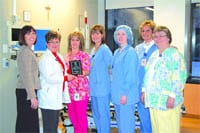Holistic Approach – Women’s Health Associates Forges Proactive Partnerships
Every day, Dr. Robert Wool spends time educating patients on disease prevention and how to stay healthy.
Although the founder of Women’s Health Associates in Westfield and his fellow practitioners focus on obstetrics and gynecology, their approach is holistic, and they teach patients what they need to know or do to avoid problems in the future.
“Women’s health doesn’t just mean a gynecological exam,” said Dr. Lydia Lormand. “It covers a wide range of topics that include birth control, hormones, post-menopausal management, and taking care of yourself.”
She noted that Pap smears are not needed annually, but yearly exams are important because they can uncover abnormalities such as cervical polyps or masses a woman may have that aren’t symptomatic.
Wool agreed, and said the practice takes a proactive stance toward health.
“Education can prevent so many things, including pregnancy,” he told HCN, noting there have never been more options for contraception, yet 50{06cf2b9696b159f874511d23dbc893eb1ac83014175ed30550cfff22781411e5} of pregnancies in the U.S. aren’t planned. Meanwhile, the incidence of conditions such as osteoporosis can be reduced by diet, exercise, and proper care.
“More than a third of women who break a hip after age 75 aren’t alive a year later,” he continued, adding that older women cherish their independence, which they often lose after a hip fracture.
Women’s Health Associates was founded in 1988, and today its practitioners include Wool, Lormand, Dr. Jacqueline Kates, and three nurse midwives. They have served generations of women in the same families, and the relationships they have forged are invaluable not only in terms of establishing a comfort level, but because knowledge about their psychosocial support systems can be critical.
Wool recently had four generations of women from one family in his office, and with the exception of the new baby girl he had delivered, they were all his patients.
“Knowing the type of support a woman has during pregnancy is important, especially when a teen is pregnant,” Wool said, noting that, if he knows the parents of a pregnant teen are not inclined to help, he can access services from local agencies to ensure the woman is able to comply with her doctor’s advice.
Indeed, trust is a critical component of the practice’s success, and patients talk to the providers about problems such as urinary incontinence or painful sex that they don’t discuss with friends, family members, or other doctors because the topics can be embarrassing.
“The information allows us to find solutions to make their lives better,” Wool said.
Lormand noted that a woman in her 20s recently told her she was in a relationship but wasn’t having sex because she didn’t have a strong sex drive. But she soon confessed that the real reason was because it was painful, which resulted in a resolution of the problem.
“We are still a mom-and-pop shop,” Wool said, adding that this small size allows them to get to know patients on a personal level.
For this issue, HCN examines the history of Women’s Health Associates, what makes the practice unique, and how its scope has changed over the last three decades.
Continuity of Care
Wool was hired by Noble Hospital in 1988 as a salaried employee to staff its newly created practice, Women’s Health Associates, that the facility decided to establish within the confines of the hospital.
“There was only one obstetrical/gynecological practice in Westfield, and it had closed a year before I was hired. One physician had retired, a second left to do a fellowship, and the remaining two moved,” he said, adding that he was given two exam rooms, a nurse, and a secretary.
About two years later, Dr. James Wang was hired to help Wool, and within a few years they purchased the practice and moved to their current location in the Pioneer Valley Professional Center at 65 Springfield St. in Westfield.
The change in location proved beneficial as it put them closer to the hospitals where they were delivering babies: Baystate Medical Center in Springfield, Providence Hospital in Holyoke, then Mercy Medical Center after Providence closed its obstetrics department in 1994.
Today, all of their patients in labor are delivered at Baystate, and they work in conjunction with the hospital’s faculty and resident obstetrics/gynecological practices.
Midwives were added to the staff at Women’s Healthcare Associates after Wool began collaborating in 1992 with Holyoke Midwives, and they taught him techniques that proved helpful to his patients.
“Birthing is a pretty natural process, and in the majority of cases no interventions are needed,” he said, noting that the midwives showed him that if a doctor is patient and allows nature to take its course, most babies can be delivered naturally without having to resort to a cesarean section.
But even though labor and delivery haven’t changed much, the way medicine is delivered has undergone dramatic shifts in the past three decades, and Wool says what sets Women’s Health Associates apart from similar obstetrical/gynecological groups is its size.
For example, during the final weeks of a woman’s pregnancy, she sees all three doctors, so when labor begins, they are familiar with her health and ability to cope with stress.
Lormand noted that, at 1:30 a.m. the night before she spoke with HCN, she received a call that a patient was in labor, and for her and other doctors, knowing a patient’s anxiety level as well as any underlying problems is far more helpful than reading a chart or being told about them.
In contrast, a woman who is a patient in a large medical practice might have her baby delivered by a physician she hasn’t met, then see a different doctor the following day in the hospital because having a large number of doctors on staff means they only have to work assigned hours.
Physicians in large practices also tend to move frequently, which can affect what a patient is willing to talk about. This is important because honesty is critical to providing care, and Wool says it is a cornerstone of the practice, but has to be reciprocal.
“If you tell a woman a procedure won’t hurt and it does, she will never tell you anything personal again,” he said, noting that they prepare patients when they know something will be uncomfortable.
Knowledge and education are critical because many people believe things that aren’t true. For example, Wool received a flood of calls from patients in 2001 after the Women’s Health Initiative published a study that said hormone-replacement therapy was dangerous.
He told the HCN that the study was flawed, and the results were eventually debunked, but the initial findings made national news and did irreparable damage.
Wool said the average age of menopause is 51 ½, and hormone therapy offers invaluable benefits because life expectancy has increased by several decades over the past two or three centuries.
“Some women have menopausal symptoms in their 60s and 70s, and women who are not on hormones develop osteoporosis at a much faster rate,” he said, noting that some researchers believe hormone-replacement therapy improves cardiac health.
Indeed, a study on monkeys whose ovaries had been removed and were fed a high-fat, high-sugar diet all developed heart disease, while monkeys in another group who ate the same diet and also had their ovaries removed, but received estrogen, never had a problem. But Wool noted the therapy needs to begin right after menopause rather than a few years later, and unfortunately, many women shy away from it due to misinformation.
Still, any treatment depends on a number of factors and needs to be discussed with a woman’s healthcare provider. But because osteoporosis is so common after menopause, Women’s Health Associates has developed a strong program to prevent it that includes the ability to do bone-density testing in its offices.
Satisfying Outcomes
The practitioners at Women’s Health Associates have always taken a proactive stance when it comes to educating patients. But they also do routine obstetrical and gynecological care, treat minor and acute problems, diagnose cancer, and work closely with specialists at Baystate Medical Center.
“It’s a real privilege to be able to treat patients over their lifetime,” Wool said, adding that he has delivered thousands of babies and enjoys seeing generations of women from the same families.
Although he and his peers perform different types of surgery and perform many tasks each day at work, he says there is no greater joy in life than delivering a baby and laying it on a mother’s chest.
It’s part of the life cycle and a very important time in a woman’s life, but only one facet of the continuum of care that Women’s Health Associates has provided and will continue to offer patients for generations to come.


